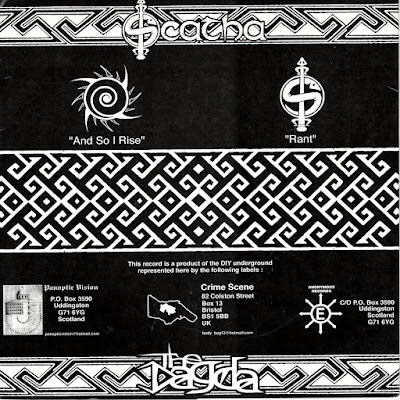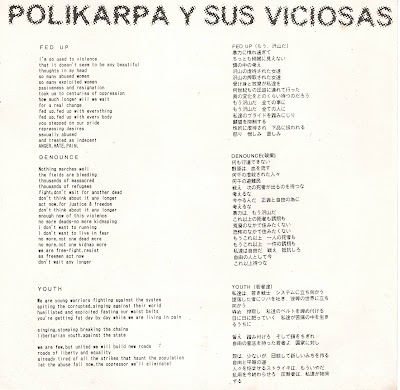Being a little too young to have witnessed Scatha live is one of those regrets I have had for a while, one that will likely never fade although it is clearly not my fault (not like that time I actually gave away for free my copy of Fall of Efrafa's Owsla, a first pressing that costs no less than 100€ today). From what I have read the band was a powerhouse live with a show-stealing drummer. And it doesn't happen that often. There are usually two situations that makes one take a look and notice the drummer during a gig. It's either because he or she is excellent and you just look in awe, enthralled at the magics or because he or she badly fucked up a couple of songs and you're wondering how plastered he or she got before playing. The latter option is pretty easy to spot since the guitar player always turns and looks at the red-faced bellend with serious concern and murder in the eyes while the singer, still facing the audience, desperate tries to maintain some kind of dignity. Oh well. Scatha's drummer belonged to the first category of course. The man is a Celtic octopus.
To be quite honest they were a band I did not quite get at first. Being advertized as having ex-members of Disaffect (I read this on a DIY distro ad promoting the band somewhere), I was expecting some fast punishing hardcore thrash but they were more complex and when I initially bought Birth, Life and Death in 2003 I was basically more than a little... circumspect. I did not dislike it but I was used to much simpler things. It's a bit like eating a chocolate layered vegan cake for the first time after years of stuffing yourself with fake Nutella. It's still chocolate-based but not as straight-forward. It took some time but I eventually did get and grown to love Scatha, which as you will learn in the foldout cover is pronounced "something like sca-huh" (that's punk linguists for you) and is the name of Celtic warrior queen. The crazy tribal rhythmic beats of the music the band used were certainly more challenging than Scatha's imagery and lyrics rooted in Celtic culture. I owned Oi Polloi's Fuaim Catha so I knew that it had nothing to do with the despicable use of Celtic symbols by neo-nazis, dodgy metal bands or my uncle Bob's dreadful tattoos. If anything a band like Scatha did teach me a few things about Celtic culture, belief system and their land-based worldview just like The Casualties taught me that punx and skinz should unite, look good on the streets and get drunk. Who said punk-rock couldn't educational?
The Dagda on the other side were the perfect, the ideal, the obvious counterpart to Scatha. Hailing from Belfast, the band's name refers to a pagan god in traditional Irish celtic mythology often represented with a cauldron and a magical harp. Thankfully the band did not use any of these attributes in their actual music as they did not exactly play experimental trippy hippie music. Just imagine the face of a grumpy sound engineer upon seeing a punk band unloading a fucking harp from their tour van. Priceless. I already knew The Dagda when I bought the split Ep through their excellent Threefold Lp which I listened to a lot (I wish the cover looked better though, I mean, why yellow?). Scatha and The Dagda together on the same record sounded like the most reliable idea where nothing could go wrong, just like a Scottish Bret Hart versus an Irish Mister Perfect in 1993.
Each band delivered one song on this one. Scatha's "Rant" starts off with a sample from the movie Easy Rider (Glycine Max actually used the very same one to introduce "Violent mind // Peaceful heart") before unleashing their unique brand of epic tribal metallic crust with an almost trance-like vibe that makes one want to sacrifice English policemen. Scatha were a pretty unique band, like Bad Influence or Contropotere, so that they are quite difficult to properly describe. As mentioned the drummer is on fire and each one of his many (and I mean many) tense dynamic rolls actually enhances the songwriting - as he's not (just) showing off - and help turn the songs into powerful cohesive units. There are hints of Disaffect and Sedition in the guitars, fairly logical considering the two guitar players were respectively involved in those band, but Scatha is the crustier band, definitely. Sometimes I am reminded of Misery's apocalyptics mixed with the writing flair and tunes of late Hiatus when they started to progress musically, maybe some sludgecore too and with those recognizable screaming anguished vocals. Production-wise "Rant" is not Scatha's heaviest moment although it certainly still rocks enough and I love how the different parts and paces of the songs work with each other smoothly. This number was recorded in April, 2022 and this was the band's swan song (two other songs that were to be included on the discography were recorded during the same session). Members of Scatha would eventually take part in bands like Ruin or TRIBE, the latter being the logical sequel in terms of Celtic tribal crusty hardcore.
On the other side, one song from The Dagda is offered, a band whose live performance in 2005 in Bradford was one of the best I had ever seen (granted I was getting a little tipsy when they started playing but then it was already late, like at least 8pm). They were an absolute powerhouse. I suppose you could say the band fell under the "neocrust" umbrella to an extent, a term that has become so synonymous with the 00's that it is seldom used as a praise. And to be fair most of the bands associated with this wave (although none of them claimed the term for themselves as I remember) haven't exactly aged well. When it all kicked out following the success of Tragedy and From Ashes Rise, I was still deep in the formative process of discovery and this new wave appealed to me at first, because the bands were often very catchy and epic in a cheesy way, not to mention that they toured so that I got to see a lot of them between 2004 and 2009. I don't listen to almost any of them these days but they are still popular in some quarters. The Dagda are an exception - along with bands like Schifosi, Muga or even Ekkaia - and if the "neocrust" tag is not irrelevant there is more to the band than this.
The band formed around 1999 (I guess?) with members of the mighty Jobbykrust and Bleeding Rectum (among many other class Belfast hardcore punk bands) so they were not exactly a beginners' act and they started playing before "neocrust" was even coined so that it might be unfair to just dump them with the subgenre without taking into account wider music dynamics. That heavy hardcore and crust punk would eventually go progressive and absorb influences from other neighbouring genres (like post hardcore, emocore or screamo) was inevitable and even welcome for everyone (although some musical blends would have been better left in the artists' imagination). To a significant extent, The Dagda can be seen as a continuation of Jobbykrust even if all the members weren't involved in them. By the end of their run in the late 90's the vastly underrated Jobbykrust had turned into a heavy and dark progressive metal crust monster that stood out at the time and heralded what was to come in terms of songwriting, notably The Dagda. In terms of intensity, emotions and melodies, the link between both bands is strong and obvious.
The Dagda's sound is dark and relentless and versatile, there are a lot of changes of paces (from pummeling d-beat, to heavy mid-paced metallic hardcore or emotional hardcore) and many different narrative parts to "And so I rise". It has that epic, triumphant, unstoppable vibe when they speed things up and the singers sound so genuinely angry and desperate that it is almost contagious. It's clear that His Hero Is Gone must have enjoyed some significant airplay at the Warzone Center in Belfast and there are many dark and melancholy driving guitar leads that would become the trademark of the ensuing punk wave. I am sometimes also reminded of Damad in terms of groove and tension. This song was part of the same recording session at Warzone as their first Lp, 2002's Threefold, that would confirm all the band's potential and remains their best and most intense work with a great story to tell (The Dagda were made for albums given the genre and their fundamentally epic narrative songwriting).
This is a good split Ep enhanced by some beautiful artwork with a band reaching its conclusion and another one its full potential. This was released in 2003 on Crime Scene Records (responsible for some Boxed In and War All the Time), Panoptic Visions (Debris and Quarantine) and Anonymous Records (Disaffect and Muckspreader).
































